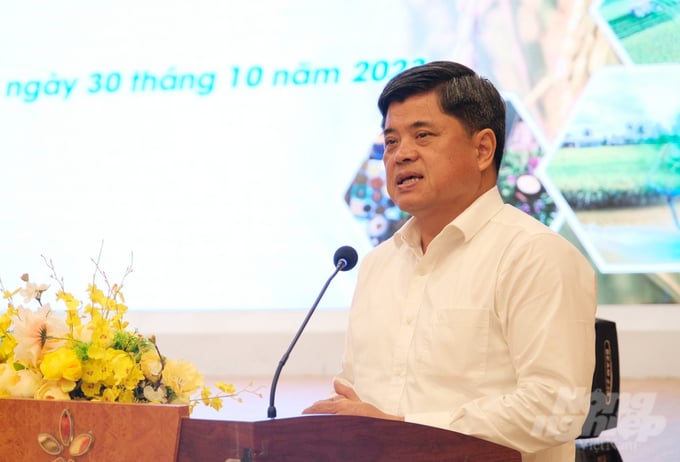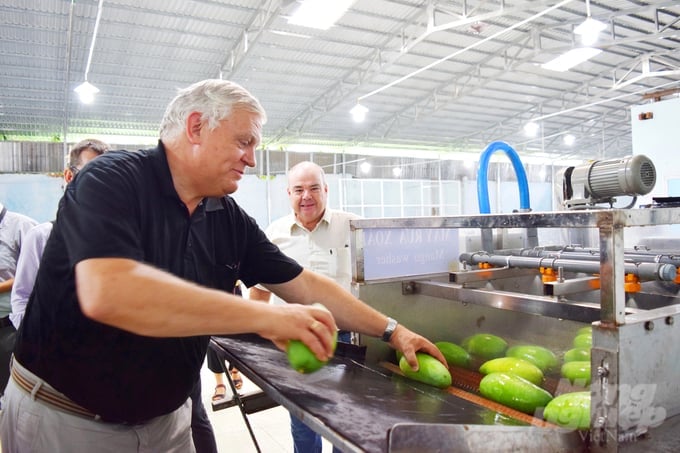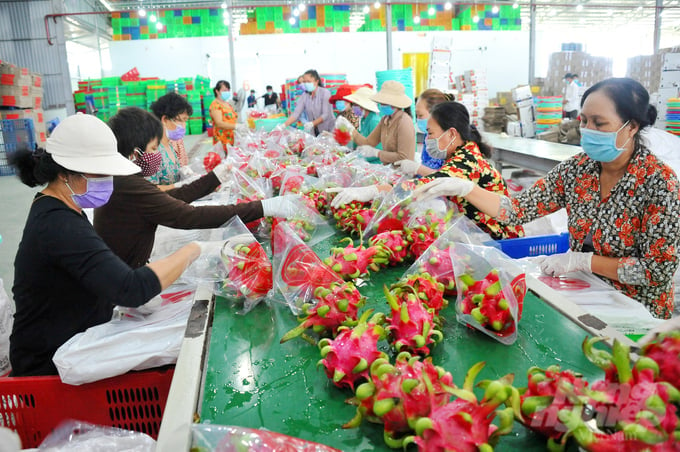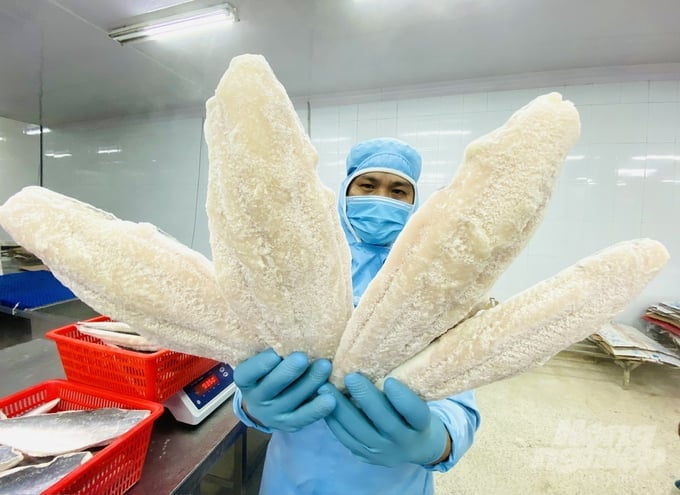November 27, 2025 | 14:11 GMT +7
November 27, 2025 | 14:11 GMT +7
Hotline: 0913.378.918
November 27, 2025 | 14:11 GMT +7
Hotline: 0913.378.918

Deputy Minister of the Ministry of Agriculture and Rural Development, Tran Thanh Nam, raises several issues regarding investment attraction in agriculture and rural sectos of the Mekong Delta region. Photo: Le Hoang Vu.
The Ministry of Agriculture and Rural Development, in coordination with the Can Tho City People's Committee, organized a conference on October 30 to promote investment in the agricultural and rural sectors of the Mekong Delta region. The conference aimed to evaluate the results of investment attraction in the development of local agriculture and rural sectors. Furthermore, participants at the conference proposed solutions to attract investment and accelerate the development of agriculture and rural areas in the Mekong Delta in the near future.
The Mekong Delta region has seen the implementation of important policies and initiatives aimed at the development of agriculture and rural sectors in the last few years. As a result, the socio-economic status of the Mekong Delta region has significantly improved, leading to a noticeable improvement in the lives of its residents.
The Mekong Delta region has successfully attracted numerous domestic and foreign investment projects in agriculture and rural development. The total registered investment capital in the development of agriculture and rural sectors in the Mekong Delta region is expected to reach 350 trillion Vietnamese dong between 2021 and 2025, marking an increase of 29.3% compared to the years between 2015 and 2020. These projects encompass various large-scale and modern technology initiatives. However, the Mekong Delta region still faces numerous difficulties and challenges, such as climate change, rising sea levels, droughts, and saltwater intrusion. Furthermore, there is a lack of a comprehensive economic and social infrastructure, and a shortage of high-quality human resources.

The Mekong Delta region has successfully attracted numerous domestic and foreign investment projects in agriculture and rural development. The total registered investment capital is expected to reach 350 trillion Vietnamese dong between 2021 and 2025. Photo: Le Hoang Vu.
Deputy Minister of Agriculture and Rural Development Tran Thanh Nam believes that investments in the agriculture and rural sectors within the Mekong Delta region will bring numerous benefits to both local and foreign investors. The region is rich in agricultural production and holds immense potential due to its major agricultural commodities such as rice, fruits, and aquatic products. The growing demand for agricultural products, both domestically and internationally, presents a prime opportunity for investors to explore the market.
In addition, the Mekong Delta region owes its sustainable development potential to the local natural advantages including fertile land, favorable climate, and abundant water resources. Investors can apply advanced technologies to enhance productivity, product quality, and value, thereby contributing to environmental protection and sustainable development.
Moreover, the Mekong Delta region enjoys governmental support policies aimed at incentivizing investment in agriculture, including support in capital, land, and tax benefits. Accordingly, investors can utilize these policies to minimize costs and enhance investment efficiency.
Mr. Nguyen Ngoc He, Vice Chairman of the Can Tho City People's Committee, stated that agriculture in the Mekong Delta region accounts for over 33% of the national agricultural GDP and 30% of the regional GDP. The Mekong Delta region leads the country in the production of rice, aquatic products, and fruits, accounting for 56% of the national rice production at 24.5 million tons; 98% of the national pangasius production at 1.41 million tons, 60% of the national production of various fruits at 4.3 million tons; 95% of exported rice and 60% of exported aquatic products. However, Can Tho city has a relatively modest agricultural land area compared to other provinces within the Mekong Delta region, with approximately 78,000 hectares of rice fields, over 23,000 hectares of fruit trees, and 8,800 hectares of aquaculture.
Nevertheless, the processing and export of agricultural and aquatic products are the city's main strengths. There are currently 45 businesses eligible for direct rice exports and 44 processing businesses eligible for direct aquatic product exports. These businesses utilize raw materials from various provinces and cities within the Mekong Delta region.
With the goal of effective investment attraction, Can Tho city has focused on implementing policies which encourage cooperative development and linkages in the production and consumption of agricultural products. The city has established a Center for Linkage, Production, Processing, and Consumption of Agricultural Products in the Mekong Delta region based on Resolution No. 45/2022/QH15 concerning special development mechanisms and policies for the pilot development program in Can Tho city.

Can Tho city has established a Center for Linkage, Production, Processing, and Consumption of Agricultural Products in the Mekong Delta region. Photo: Le Hoang Vu.
Most notably, Can Tho city's Center for Linkage, Production, Processing, and Consumption of Agricultural Products in the Mekong Delta region aims to encourage the establishment of a partnership model between farmers and businesses. This model aims to foster relationships between the production and industrial processing of agricultural products. Consequently, the goal is to build brand recognition, contribute to the increase in import-export volumes and the added value of products with the overarching objective of a "one-stop multi-service destination."
The center will attract investment projects specializing in industrial manufacturing and supply services for industrial production, with a focus on deep processing for agricultural products in the Mekong Delta region. Subsequently, the center will attract high-tech and IT investment projects and serve as a focal point for preserving and processing key agricultural products within the region. The well-structured transportation infrastructure (including sea, land, and air routes) will also facilitate the expansion of agricultural products from the Mekong Delta.
To capitalize on advantages and prompt the rapid and sustainable development of the Mekong Delta region, extensive investment from both domestic and foreign businesses and investors is essential.
Mr. Nguyen Phong Phu, Technical Director of Vina T&T Group, shared: "The agricultural sector, especially tropical fruits in Vietnam, has received significant investments in the last few years. With extensive experience, high-quality and diverse crops, Vina T&T Group is a leading exporter of fresh fruits such as mangoes, longans, rambutans, coconuts, lychees, dragon fruits, durians, and pomelos to demanding markets around the world. The company is currently at the forefront of Vietnam's fresh fruit exports to the U.S. However, fruit exporters are facing numerous challenges compared to other fruit-exporting nations such as Thailand."
Mr. Phu highlighted current issues faced by fruit exporters, which include meeting food safety standards and avoiding excessive levels of residual pesticide when exporting to stringent markets. The control of Maximum Residue Levels (MRLs) of plant protection products in the originating country is becoming increasingly stringent, with the requirements rapidly dropping.

There are currently 45 businesses eligible for direct rice exports and 44 processing businesses eligible for direct aquatic product exports. These businesses utilize raw materials from various provinces and cities within the Mekong Delta region. Photo: Le Hoang Vu.
The supply chain inefficiency and high transportation costs; outdated preservation technology; high production costs; decentralized and non-concentrated production; high levels of post-harvest losses at between 10 and 25%; short product lifespan due to fungus, fruit flies, and aphids have been identified as major issues in the export of VIetnamese agricultural products.
Accordingly, Mr. Nguyen Phong Phu has proposed several policy suggestions to the Ministry of Agriculture and Rural Development. This includes prioritizing policies focused on agricultural land concentration; support for research in the agricultural sector; stabilizing the prices of inputs and outputs in agriculture; enhancing training and awareness for the agricultural workforce; and implementing policies concerning water usage in the region.
"The Investment Promotion Conference for Agriculture and Rural Development in the Mekong Delta region in 2023 has been an opportunity for businesses and investors to exchange information regarding investment potential and opportunities in the Mekong Delta region. Additionally, it's a platform for information exchange, networking, and establishing partnerships to foster investment in agriculture and rural development in the Mekong Delta region. With support from all levels of the government as well as active participation from businesses and investors in the Mekong Delta, the Mekong Delta will be positioned as a key development region in the country," emphasized Deputy Minister Tran Thanh Nam.
Translated by Nguyen Hai Long

(VAN) Tay Ninh’s livestock sector is undergoing a major transformation, applying high-tech, closed-loop circular models to build sustainable value chains.
/2025/11/26/3627-4-082628_818.jpg)
(VAN) From a small café on the red basalt highlands, Le Van Hoang started a business with clean coffee, building Enjoi Coffee into a symbol of organic agriculture in the Lam Dong plateau.
/2025/11/25/0045-1-135246_13.jpg)
(VAN) Ca Mau is researching a model of sea-encroaching embankments combined with viaducts and logistics service zones, aiming both to prevent erosion and create land funds for marine economic development.

(VAN) The information was shared at the seminar 'Urban Agriculture - Solutions for Developing Green Spaces,' organized by the Kinh te & Do thi Newspaper and the Biotechnology Center of Ho Chi Minh City.
/2025/11/19/4141-2-132831_216.jpg)
(VAN) One of Japfa's outstanding solutions is implementing digital transformation and artificial intelligence (AI) to optimize operations, enhance productivity, and advance sustainable development.
/2025/11/19/4847-1-093540_448.jpg)
(VAN) The Gia Lai Provincial People’s Committee had a working session with the delegation of the U.S. Department of Agriculture, the State of Idaho, and representatives of the State's leading enterprises.

(VAN) Ca Mau has a sufficient foundation to become a strong regional aquaculture center, where production integrates the economy, the environment, and the lives of the people.